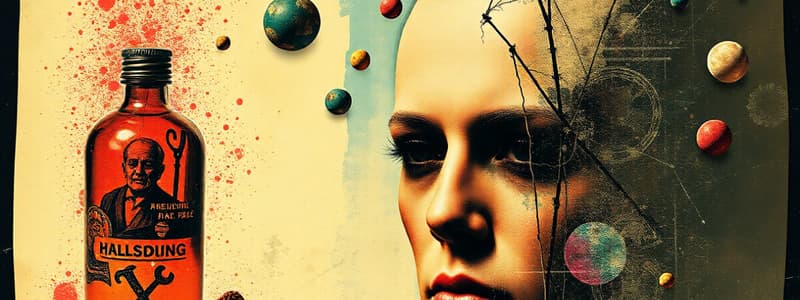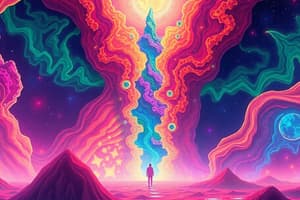Podcast
Questions and Answers
Hallucinogens always cause addiction in users.
Hallucinogens always cause addiction in users.
False
LSD was first synthesized in 1938 by Albert Hofmann.
LSD was first synthesized in 1938 by Albert Hofmann.
True
Psychedelic hallucinogens filter sensory information to enhance user perception.
Psychedelic hallucinogens filter sensory information to enhance user perception.
False
Natural compounds like mescaline and psilocybin are classified as hallucinogens.
Natural compounds like mescaline and psilocybin are classified as hallucinogens.
Signup and view all the answers
Entactogens produce experiences of emotional connection and empathy.
Entactogens produce experiences of emotional connection and empathy.
Signup and view all the answers
Hallucinogens can be ingested only in pill form.
Hallucinogens can be ingested only in pill form.
Signup and view all the answers
PCP is considered a type of stimulant.
PCP is considered a type of stimulant.
Signup and view all the answers
People have used hallucinogens for medicinal purposes since ancient times.
People have used hallucinogens for medicinal purposes since ancient times.
Signup and view all the answers
Study Notes
Hallucinogens
- Hallucinogens, also known as psychedelic drugs, alter perception, including senses of hearing, seeing, thoughts, and feelings.
- They cause vivid imaginations, hallucinations, and visual distortions.
- Hallucinogens do not directly cause addiction, but users can become addicted to the effects.
Types of Psychoactive Drugs
- Hallucinogens
- Stimulants
- Depressants
- Opiates & Opioids
Lecture Objectives
- Define hallucinogens and provide examples.
- Explain different classes of hallucinogens.
- Explain the physiological effects of hallucinogens.
Examples of Hallucinogens
- LSD
- Ketamine
- PCP
- Marijuana
- Amphetamines (mescaline, psilocybin, anticholinergics)
History of Hallucinogens
- Albert Hofmann synthesized LSD in 1938.
- He accidentally tasted the stimulants and documented his experience.
- Hallucinogens have existed for a very long time in the form of mushrooms.
- Ancient people used hallucinogens for medicinal and religious purposes.
- Some people still use hallucinogens for medicinal purposes, though often illegally.
How Hallucinogens are Taken
- Swallowed (pills, drinks)
- Smoked
- Placed on the tongue (blotter acid)
- Injected (intravenously or intramuscularly)
Subclasses of Hallucinogens
- Psychedelics
- Entactogens
- Dissociatives
- Atypical
Psychedelics
- Under normal conditions, the brain filters out aspects of the environment. Psychedelics remove this filtering process.
- Users experience an overwhelming sense of expansion in colors, sounds, smells, and textures.
- Common experiences include visions and voices.
- Examples include LSD, Psilocybin, Mescaline, and DMT (ayahuasca).
Entactogens
- Produce emotional communion, oneness, relatedness, and empathy/sympathy.
- Show therapeutic benefit for post-traumatic stress disorder and anxiety.
- Example: MDMA
Dissociatives
- The brain's ability to translate sensory perceptions is affected.
- Users experience sensory deprivation altering their internal perceptions.
- Dissociative effects can vary from dose to dose and drug to drug, but typically produce "out-of-body" experiences which can leave users in a trance-like state.
- Examples include Ketamine, DXM, and Nitrous Oxide.
Atypical
- A group of unrelated substances with hallucinogenic properties, diverse mechanisms of action and legal status.
- Examples include Ibogaine, Salvinorin A, and THC.
Harmful Effects
- Physical: flash backs, increased energy, rapid heart rate, nausea.
- Emotional: mood swings, panic attacks, loss of senses, depression.
Mixing with Other Drugs
- Mixing hallucinogens with stimulants can cause extreme stress to the body.
- Mixing hallucinogens with alcohol further impairs coordination and increases the risk of vomiting.
Studying That Suits You
Use AI to generate personalized quizzes and flashcards to suit your learning preferences.
Related Documents
Description
Explore the world of hallucinogens, their types, and effects in this comprehensive quiz. Learn about the physiological impacts and historical context of these psychedelic substances. Test your knowledge on various classes of psychoactive drugs and their significance.


